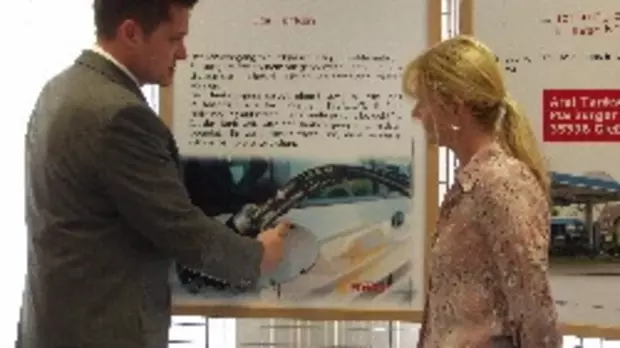
At motor shows, it is the spectacular concepts such as fuel cells and hybrid drives that are celebrated. In the shadow of these media-effective developments, a genuine alternative that has long been ready for series production is secretly gaining more and more market share: The natural gas car.
Stadtwerke Gießen AG (SWG) has been focussing on natural gas as a fuel since mid-2002. The municipal utility's fleet already includes 19 natural gas vehicles.
The Giessen-based energy and water supplier is now aiming to familiarise interested parties with this technically safe alternative. To this end, SWG is organising an exhibition in the infoZentrum on the market square.
Over the next few weeks, everything there will revolve around natural gas vehicles. Energy consultants will be on hand to answer questions on the upper floor.
The exhibition offers a wide range of information. From technical safety and the advantages of the natural gas fleet to the municipal utility's subsidy programme, the energy consultants will provide information.
Technical safety
Natural gas as a fuel is not only a sensible alternative, but also a safe one. In fact, higher safety standards apply to natural gas cars than to petrol cars. Crash tests have shown that the natural gas tank is the most stable component of the vehicle.
The advantages are obvious
The unrivalled low price and environmental benefits favour natural gas as a fuel. Vehicles optimised for natural gas are characterised by very low pollutant emissions compared to petrol and diesel cars: Carbon dioxide and nitrogen oxide are reduced by up to 80 per cent compared to petrol cars (30 per cent compared to diesel). The combustion of natural gas is practically soot and particle-free.
Refuelling at half the price
Not only the environment benefits, but also the wallet of the owner of such a vehicle. With natural gas, refuelling costs are halved compared to petrol. Compared to diesel, you can still save 30 per cent.
Higher purchase costs
Only the purchase costs for a natural gas vehicle are higher than for petrol-powered vehicles. The additional costs for passenger cars are between 1,500 and 3,500 euros. The initial additional costs are quickly recouped by the favourable tank price and the savings on vehicle tax.
The SWG subsidy programme
The municipal utilities offer a subsidy programme for all natural gas vehicles designed by the factory and registered in the Giessen region. Those who opt for this subsidy only pay half price for the fuel at the Giessen natural gas filling station in Marburger Strasse 229 for a period of one year.
Filling up with natural gas - quick and easy
The refuelling process takes just as long as refuelling with conventional fuels, i.e. around three to five minutes. Instead of a petrol nozzle, the natural gas dispenser is equipped with a filling nozzle. This is placed on the filler neck on the vehicle and locked by flipping the lever. The refuelling process is started at the push of a button. When the tank is full, the process ends automatically.
Fuelling stations for the natural gas fleet
The fact that the natural gas fleet is gaining ground is illustrated by the development of natural gas vehicles and filling stations. Whereas at the beginning of the year 2000 there were only just over 100 natural gas vehicles on the road throughout Germany, there are now over 20 thousand vehicles with natural gas in their tanks. The network of petrol stations is also becoming increasingly dense. There are now over 420 petrol stations in operation where natural gas can be filled up in just a few minutes.
Visitors to the infoCentre can also find out which models are available ex works, from city runabouts to luxury cars. Anyone wanting to get an initial overview should definitely visit the SWG exhibition. The exhibition also offers useful information for those already interested in the subject.
The experts are available to customers at the infoCentre from Monday to Friday from 9 am to 6 pm and on Saturdays from 9 am to 2 pm.

